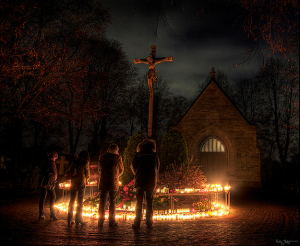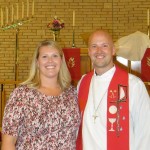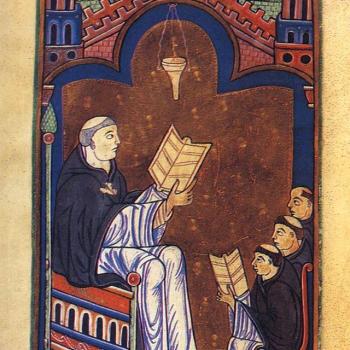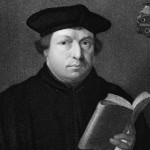
What does Halloween mean? It is “Hallowe’en”, which mean’s “All Hallows’ Eve”, or “All Saint’s Eve”. Analogous to Christmas Eve, it is the beginning of All Saints’ Day and starts at sundown on October 31st.
The old English “hallowed” means holy, sanctified, “set apart” (as for service). Martin Luther’s 95 theses were meant for all Christians, or all “holy ones” – “saints”. He posted them in 1517 on “All Hallow’s Eve”, or “All Saint’s Eve”, at the All Saints’ Church (the University of Wittenberg campus church) in Wittenberg, Germany
Martin Luther’s core message?: All Saints are saved by grace, through faith, revealed by God’s Word in Christ. Thesis 11 of his 95 theses read: “Every true Christian, whether living or dead, has part in all the blessings of Christ and the Church; and this is granted him by God, even without letters of pardon” [i.e. “indulgences”]
So where did the day originally come from? In the first 300 years of the church, so many were martyred for their faith that throughout the church days were set aside to remember all Saints.

The earliest reference to a day being dedicated to the commemoration of All the Martyrs and All Saints of the Christian Church comes from the 2nd century. The document is titled The Martyrdom of Polycarp.
“…whenever we can gather together in joy and happiness, the Lord will allow us to commemorate the birthday of his martyrdom, both in memory of those who have already engaged in the struggle and as a training and preparation for those who are about to do so.”
Well-known early saints (from the 4th and 5th century) Ephraim the Syrian, Basil of Caesarea, and St. John Chrysostom also all speak of a common day set aside to remember and honor all the saints in the church.
But didn’t Hallowe’en absorb and adopt the Celtic new year festival, Samhain, as the Oxford Dictionary of World Religions says?

In Halloween: From Pagan Ritual to Party Night (Oxford University Press, 2003) scholar Nicholas Rogers states:
“[By 800], in England and Germany, this [festival remembering the saints] took place on [November 1]. In Ireland, it was commemorated on 20th April, a chronology that contradicts the widely held view that the November date was chosen to Christianize the festival of Samhain.” (from this BBC article)
Christian scholar Joseph Abrahamson has written a more in-depth exploration of the origins of Halloween here. For practical advice about how to celebrate Halloween also see his post here. His second post features these concluding remarks:
It should not be surprising that Satan and the World have gone to such extremes to defile Halloween with anything that would distract Christians and the unbelievers from Sola Scriptura, Sola Fide, Sola Gratia and Solus Christus…. Reclaiming Halloween means knowing where it comes from, why the day was established, and the historical significance it holds for the Christian Church. Satan and the world are always willing to undermine and steal anything that is of value to the confession of the truth of Scripture. Let us not fall prey to the lies.
A very happy “All Saint’s Eve” and day to all this week. And, Reformation Day as well…. Semper reformanda! (Latin for “the church is always to be reformed”)
FIN
Images: Wikipedia












